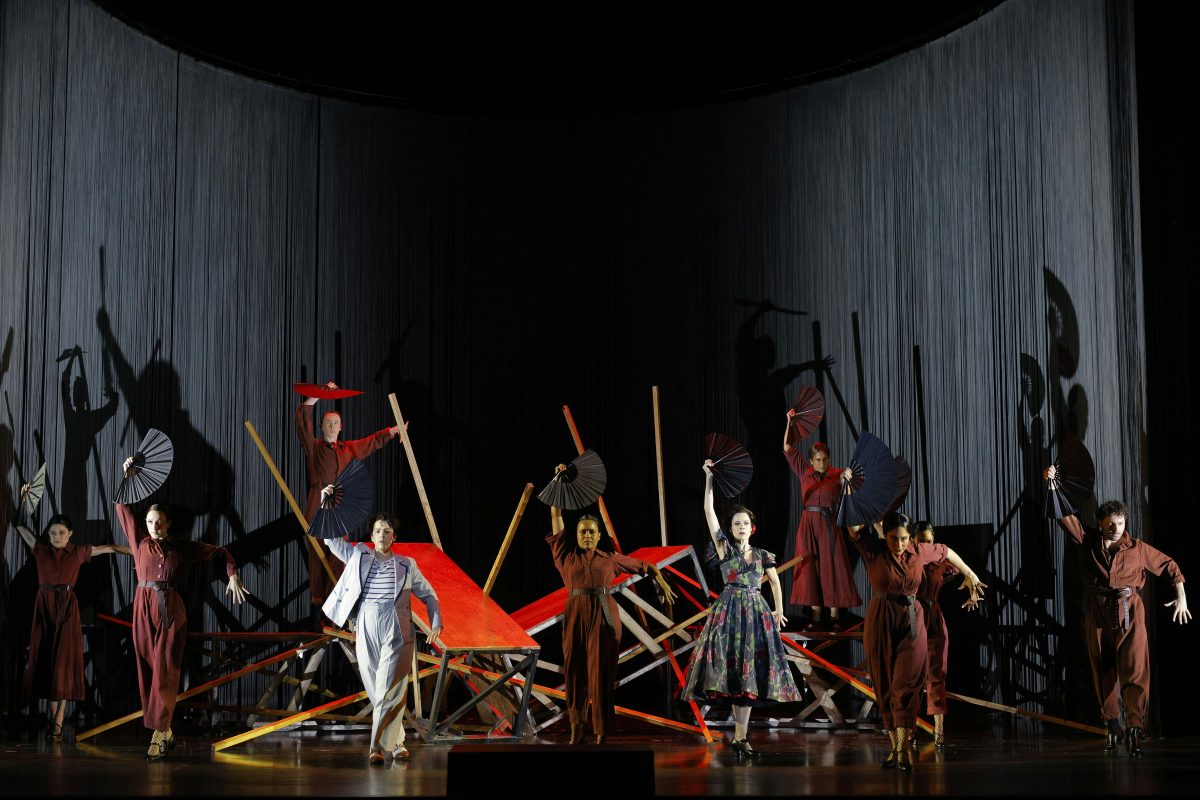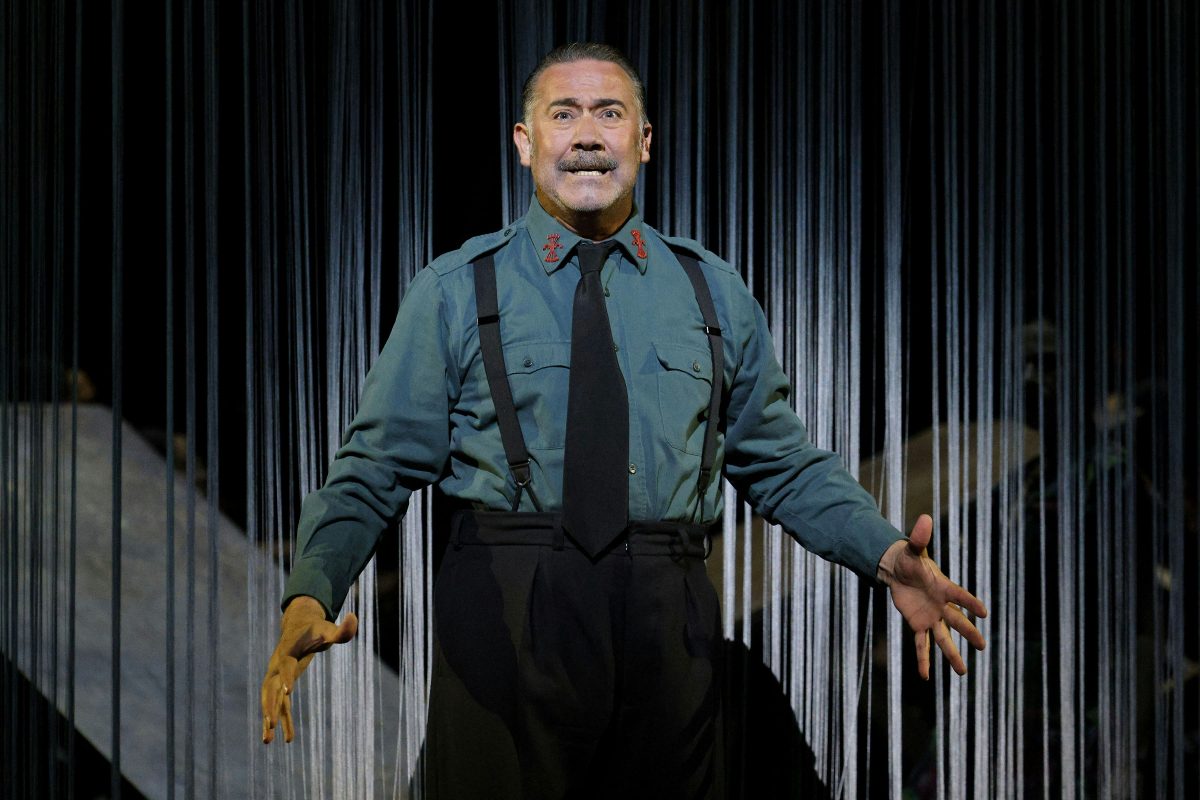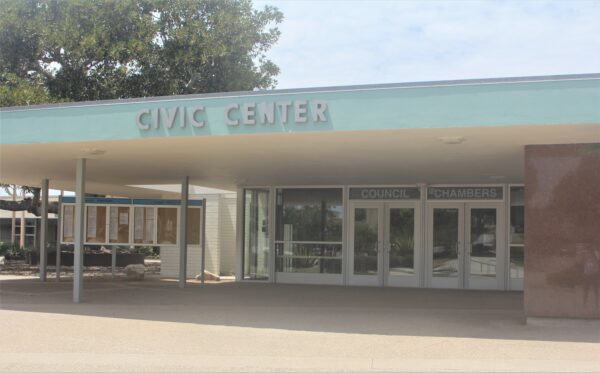The tragic tale of Federico García Lorca
Pools of sorrow at LA Opera’s “Ainadamar”
by Bondo Wyszpolski
Osvaldo Golijov’s funereal opera, which leans heavily towards dance-theater, is also something of a memory play, in which an aging actress, Margarita Xirgu (soprano Ana María Martinez), recalls her friend and collaborator, the Spanish poet and dramatist Federico García Lorca (sung by mezzo-soprano Daniela Mack), as she prepares to take the stage.
In the operatic repertoire, where most works date back a century or two, “Ainadamar” is quite the youngster. It premiered in 2003, and has a libretto by David Henry Hwang, written in English before being translated into Spanish by the composer. As a child of the 21st century, “Ainadamar” is an intense, scaled-down piece that eschews the overblown or bombastic, and is instead often stylistically bold and exciting.

Lorca, considered among the preeminent Spanish playwrights of this century, may be best known for “Blood Wedding” and “The House of Bernarda Alba”. From the window of his boyhood home he could see a statue of Mariana Pineda (1804-1831), who was martyred a century earlier. And so Lorca wrote a play, “Mariana Pineda,” which premiered in Madrid in 1927 and starred Margarita Xirgu in the leading role.

But then we have the fictitious Nuria (soprano Vanessa Becerra), a pupil or disciple of Xirgu’s, whose purpose here is to preserve and perpetuate the memory of the deceased writer. She sings: “Perhaps he already knew/ somewhere in that poet’s soul/ that his fate and hers/ would be as one.”
It’s all a little reminiscent of the García Márquez novella, “Chronicle of a Death Foretold,” or one of the plays (“Time and the Conways,” “An Inspector Calls”) by J.B. Priestley.
As mentioned, this is somewhat of a memory play, and so in a sense we are experiencing Margarita Xirgu’s last thoughts as she stands in the wings of a stage in Montevideo, Uruguay. In reality, she was in the Americas when the Spanish Civil War broke out, and never returned to Spain.
I’m assuming that Lorca’s story resonated in a more personal way for the composer, since Golijov, who grew up in Argentina, experienced the heyday of the military dictatorship that ruled the country from 1976 to 1983; and in some manner his role is a little like Xirgu’s student Nuria, whose implied responsibility is to ensure that what transpired is not forgotten: Here it is, pass it on. And I’m sure it hardly needs be said that the opera is timely today as a would-be strongman sits in the White House.

So, what makes this opera memorable? First, I have to confess that although I saw Long Beach Opera’s production of “Ainadamar” at the Terrace Theater back in 2012, I can’t recollect anything about it. Barring my untimely death, will I have lost virtually all memory of this production when we come to the end of the next decade?
Answer: I think not. Furthermore, I’ve been listening intently to the 2006 Deutsche Grammophon recording that featured Dawn Upshaw and Kelley O’Connor.
At any rate, there are facets of the current rendition that are worth noting:
It’s mostly a riveting and exquisite production, with dynamic lighting (Paul Keogan), a mesmerizing use of projections (Tai Rosner), compelling flamenco choreography (Antonio Najarro), directed and with additional choreography by Deborah Colker, and conducted with true passion by Lina González-Granados. I also want to highlight two other performers who enthralled me: tenor Alfredo Tejada as the vigilante Ramón Ruiz Alonso (with his muezzin-like calls for the arrest of Lorca) and the sensuous solo dancer Laura Peralta.
That’s before mentioning the score, often excitingly percussive and at other times dreamy and surrealistic (as when the young ladies sing “Mariana Pineda, tus ojos/ brillantes como luceros…” etc. [Mariana Pineda, your eyes shine brighter than the stars].) The singing also employs a style known as cante jondo, which means “deep song” in Spanish, and is, according to Golijov, “what people call flamenco but it’s actually deep song from Andalusia sung by the Roma people.”

But there are certainly some fine, knock-out moments, such as the choreographed fan dance, where fans snap shut and spring open, or when four dancers go through their movements while standing atop tall columns. I felt rather anxious just watching them.
To sum up, everything coheres, enclosing the audience in a perfect environment where one can lose oneself while witnessing a creative retelling of the life and tragic death of a notable young man who gave the world so much, and who could have given it even more.
Ainadamar is onstage at the Dorothy Chandler Pavilion, 135 N. Grand Avenue at the Music Center in downtown Los Angeles. Additional performances, Saturday, May 3, at 7:30 p.m.; Sunday, May 4, at 2 p.m.; Wednesday, May 7, at 7:30 p.m.; Thursday, May 15, at 7:30 p.m.; and Sunday, May 18, at 2 p.m. “Ainadamar” is sung in Spanish with both English and Spanish supertitles projected above the stage. Note: After the May 4 matinee, everyone is invited to enjoy music, food, and fun on the Music Center’s Jerry Moss Plaza for a Celebración de las Artes hosted by LA Opera Connects and Hispanics for LA Opera. Also, the May 7 performance will mark Pride Night, with a special post-performance gathering for attendees. Tickets begin at $24.50 and can be purchased online at LAOpera.org, by phone at 213.972.8001, or in person at the LA Opera box office. More information about the production is available at LAOpera.org/Ainadamar. ER










